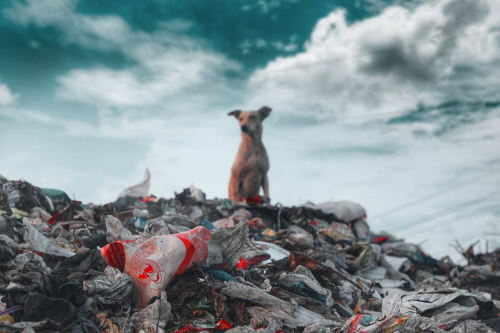Southeast Asia: Stop Sending Us Mountains of Plastic Waste
东南亚国家饱受垃圾进口之苦
Wealthy countries are exporting millions of tons of plastic waste to Southeast Asia, where local recycling systems cannot process all of it.
许多富国正在出口大量垃圾到东南亚,而东南亚当地的垃圾回收系统无法全部处理这些垃圾。
Greenpeace and the Global Alliance for Incinerator Alternatives, or GAIA, studied the issue. Their joint investigation found that the exports of plastic waste are causing widespread pollution problems.
绿色和平组织和全球反垃圾焚烧联盟(GAIA)研究了这个问题。他们通过一起调查发现:垃圾废弃物出口已经造成了广泛的污染问题。
Greenpeace and GAIA workers gathered information from the top 21 importers and exporters of plastic waste. They looked at the recycling trade before and after the Chinese ban.
绿色和平组织和GAIA的工作人员收集了信息,信息来源是塑料废弃物进口和出口量排前21的国家。他们观察了中国采取禁令前后垃圾回收贸易的情况。
Kate Lin is a project leader at Greenpeace. She told VOA that these Southeast Asian countries do not have the ability to make all that plastic useful again.
凯特·林是绿色和平组织的一位项目经理。她在接受我台采访时表示,许多东南亚国家没有回收海量垃圾的能力。
They do not have enough capacities for handling such a large amount of imported foreign waste, so there is some pollution to the local environment.
这些国家能力不够,无法应对国外进口的大量垃圾,所以当地环境就受到了污染。
The Malaysian village of Jenjarom is about 50 kilometers outside Kuala Lumpur. Nearby, one finds huge piles of plastic waste on the ground in the middle of a palm oil farm. Nobody is working to reduce the size of the piles. The writing on the bottles, boxes and plastic bags shows where they came from. Much of the waste has traveled thousands of kilometers from Europe and North America.
马来西亚的仁嘉隆镇位于吉隆坡外大概50公里的地方。在这附近可以发现大量塑料废品堆积在某棕榈油农场中间的地面上。没有人采取任何行动来减少这堆垃圾的总量。瓶身、盒子和塑料袋上的文字可以显示这些垃圾的来源。其中许多垃圾都跋山涉水从欧洲和北美洲而来。
People are suffering because of this waste, said local environmentalist Pua Lay Peng.
当地环境学家普阿表示,人们饱受进口垃圾之苦。

They just dump the non-recyclable plastic or the rejected product, and then they burn it in the backyard of these factory. So, those toxic steam fume actually already caused a lot of health problems to our residents.
他们只管丢弃不可回收的塑料品和废品,然后在这些工厂的后院进行焚烧。这些有毒的气体实际上已经给当地居民造成了许多健康问题。
Kate Lin said wealthy countries are simply exporting their waste problems. They do not follow up on what happens after it crosses the border.
凯特·林表示,一些富国只是将自己的垃圾问题出口到了其他国家,他们并不会跟进垃圾出口后会发生什么。
They have good collection facilities, but actually they are sending half of their collected waste to other countries.
他们自己有完善的收集设备,但实际上,他们还是将收集来的半数垃圾送往了其他国家。
Many Southeast Asian countries are beginning to restrict plastic waste imports. That forces the trash into markets with fewer controls, such as Indonesia and India.
很多东南亚国家正开始限制塑料垃圾的进口,这迫使垃圾流入了其他管理相对宽松的市场,比如印尼和印度。
At a United Nations conference in Geneva this week, 180 countries have been discussing a new rule that may help. The rule would force plastic waste exporters to get permission from officials of the countries before they accept the waste. The system, known as “prior informed consent,” is already used for more hazardous waste.
在本周日内瓦举行的联合国会议上,180个国家讨论了一个新的条例,这个条例可能有帮助。该条例会迫使塑料垃圾出口国先获得进口国官员的许可。这个体系名为“事先知情准许令”。该准许令已经应用于危害更大的垃圾上了。
For those dealing with the effects of the waste, the changes can’t come soon enough, said Pua.
普阿表示,对于处理垃圾影响的人来说,这种转变来的很是时候。
We are killing ourselves by using too many plastics. We are too dependent on plastic. Please manage and handle your own trash. Don’t dump to our country.
使用过多塑料,无异于自取灭亡。我们太依赖塑料了。请管理好你们自己的垃圾,不要扔到我们国家来。
Greenpeace said improving recycling is not the final solution. Instead, the world must severely reduce plastic production and consumption worldwide.
绿色和平组织表示,提升垃圾回收能力并非最终的解决方案。相反,全世界必须大幅减少塑料的生产和消耗。
英文、中文版本下载:http://www.yingyushijie.com/shop/source/detail/id/1289.html








